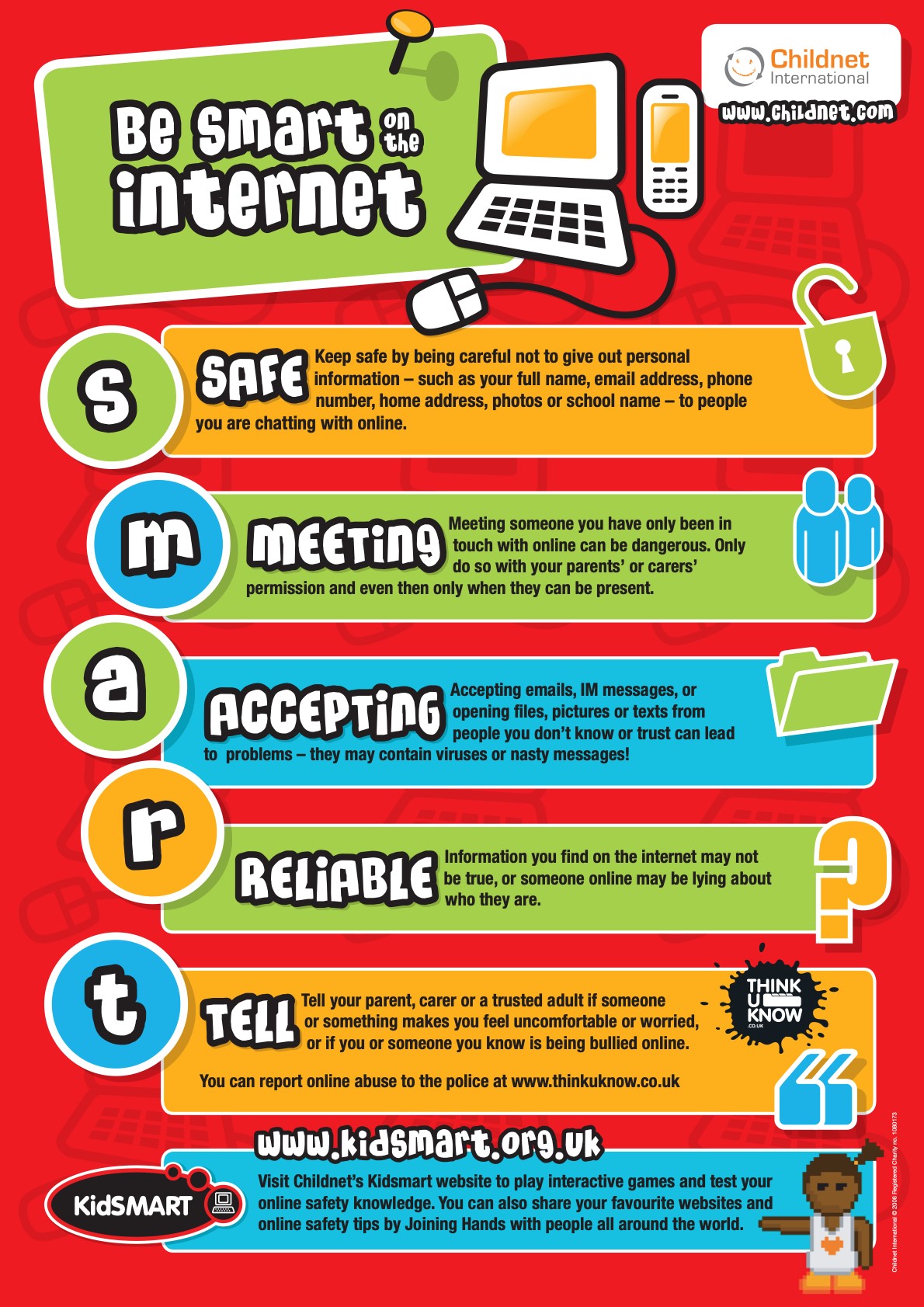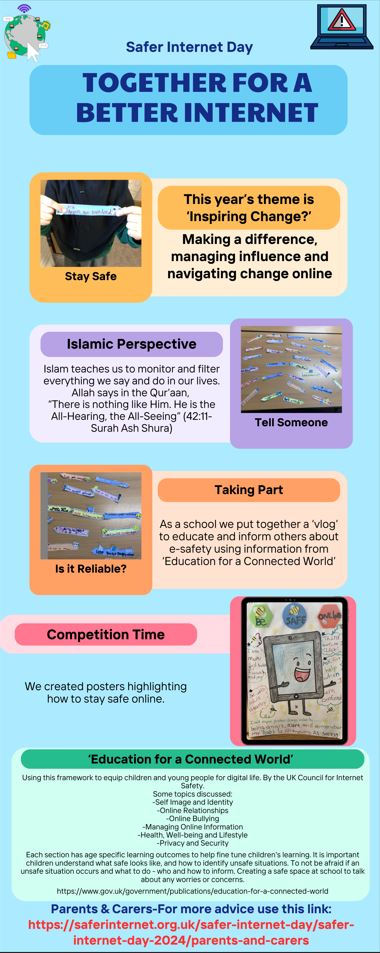E-safety is an integral part of children’s education in today’s digital world and is embedded in their learning at Land of Learning Nursery and Primary School. We also want to help our parents and children improve their own understanding of e-safety issues so they can learn to use the internet and all digital media in a safe and secure way.
As a parent, you will know how important the internet is to children – they use it to learn, play, socialise and express themselves. It is a highly creative place of amazing opportunities. But the technology children use every day can seem a bit daunting and you might worry about the risks your child can face online – such as bullying, contact from strangers or the possibility of them seeing illegal or inappropriate content.
As part of your child’s curriculum and the development of computer skills, we provide access to the internet only in teacher supervised lessons. We strongly believe that the use of the web and email is hugely worthwhile and an essential tool for children as they grow up in the modern world. But because there are always concerns about children having access to undesirable materials, we have taken positive steps to deal with this risk in school. Our school internet access provider operates a filtering system that restricts access to inappropriate materials.
At the start of the school year, each class discusses how we can all stay safe online and the dangers we may face on the internet. We then ask every child in KS2 to sign an Acceptable Use Agreement so that we know they have read and understood our school’s rules on staying safe.
Online Safety suggestions for parents
This document will give you some hints and tips to keep your children safe on the internet, when using computers, tablets and phones, and when accessing social media. Young children are increasingly digitally literate, and as adults, we need to know what they are up to and teach them how to keep safe online.
Social media:
Technically, children under the age of 13 shouldn’t be building profiles on Facebook, Instagram and Snapchat etc. This is difficult, as many of their friends may already have profiles. Some sites such as YouTube, allow children aged 13-17 to have profiles under their parent’s consent. Twitter’s terms of use are a little more confusing, and imply that children under 13 can have a profile with their parent’s consent. When your children are old enough to access social media, take time to sit with them and go through privacy settings, explaining who can see what they publish.
Passwords:
Though you need to be teaching your children about password safety, and encouraging them not to share passwords with their friends, you also need to let them know that you can and will have access to their equipment and that you need to have access to their password, even if you don’t memorise it. This will help them lock themselves out of their equipment by forgetting their password, and also means that you can go in and oversee their online behaviours, with their permission. Teaching them how to create a strong password is a good idea – starting with mixing numbers and letters with very young children. Take time to explain your reasons for needing to know their password, and why they shouldn’t share it with anyone else.
Messaging and group chat:
Thais can be tricky area to police, as by its very nature, it is hidden from public view. Make sure that you check in with your child regularly about their group chats, who is taking part in them, and make sure that they are only talking to people that they know in real life. Ask them to show you some of the conversations so that you can get a feel for what’s going on in the chats. Keeping an open dialogue will help to maintain the trust between you and your children, and will ensure that your child will feel that they can come and talk to you if something is worrying them online.
Gaming:
Lots of children enjoy gaming on their video consoles and on the internet. Open and closed groups can easily be set up by children, and you need to know what is going on in their online play, in the same way as you do in their face -to-face relationships. Sit with them whilst they are engaged in their games, and ask them about what is happening. Who are they talking to? What are they playing together? Build up an interest in their game playing, and again, you will open that dialogue to engage with your child if they feel things are worrying them.
The most important thing you can do, is talk to your child. Engage in their interests and find out what they are up to. Talk the talk, and they will feel confident to talk to you if things are troubling them online.
A Guide for Parents
Whether we like it or not, technology and the internet are firmly fixed in our children’s lives. Use of the internet can be a wonderful thing, opening up new words and supporting children’s learning and development in many ways, as well as being a fun way to relax and keep in touch with friends and family. However, we are all aware of the pitfalls and dangers of the online community, and since most of the current generation of parents grew up in the days before smartphones, we can feel a little clueless as to how best to protect our children. Here are some ideas which will help you:
- Set up parental controls on your home broadband and all internet-enabled devices your child has access to.
- Password-protect all accounts.
- Choose the sites your child has access to on their account.
- Switch devises to airplane mode when your child is playing online games. This will prevent from accidentally making in-app purchase or contacting other players online.
- Pay close attention to the age ratings on games, apps and films to make sure they are suitable for your child. If you would not allow your child to watch a 15-certificate film, you should not let them play a game with the same rating. • Set your homepage to a child-friendly one.
- Keep all devices your child will use, in a high-traffic communal area in your home, such as the kitchen or living room. Be with your child when they are online and talk about what they are doing.
- Set rules for screen time and stick to them.
- Investigate safe social media sites for kids.
- Sometimes children find themselves bullying or being bullied online (also known as ‘cyberbullying’). Talk to your child about being a good friend online, and how our words and actions still hurt even if we can’t see a person’s reaction to them.
- Talk regularly about the importance of online safety, and about what your child is getting up to online. You’ll be grateful you did this, especially as your child gets older. Keeping those lines of communication open is a powerful way of letting your child know that you trust them but expect them to be honest
Research shows that the age at which children are accessing smart devices and the Internet is getting younger and younger. It’s never too soon to start good e-Safety habits with your child.
At Land of Learning Nursery and Primary School we follow the SMART rule:


Online Safety Tips for Parents of pre-school children 0-5 Year Olds
Online Safety Tips for Parents of primary school children 6-10 Year Olds
Online Safety Tips for parents of 11-13 Year Olds
Five A Day Healthier Screen Time Poster
5-11 Evington Drive, Leicester LE5 5PF
0116 273 5431
office@landoflearning.co.uk
5-11 Evington Drive, Leicester LE5 5PF
0116 273 5431
office@landoflearning.co.uk



